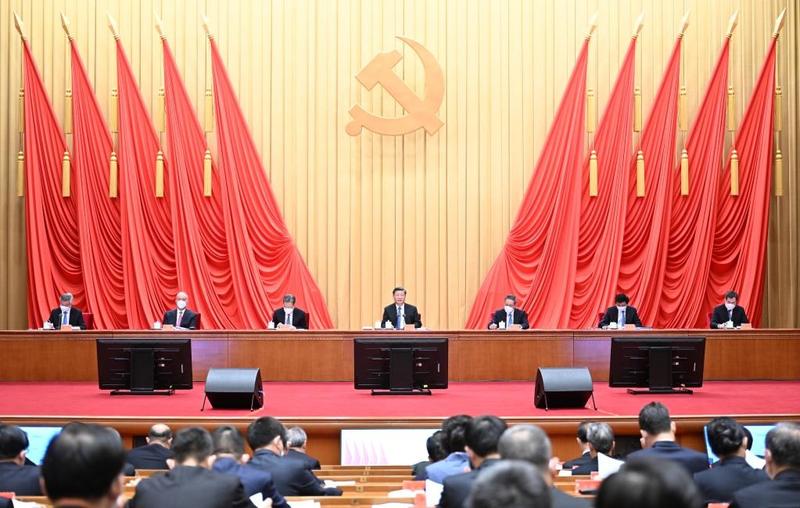 General secretary of the Communist Party of China (CPC) Central Committee Xi Jinping, also Chinese president and chairman of the Central Military Commission, addresses the second plenary session of the 20th CPC Central Commission for Discipline Inspection in Beijing, capital of China, Jan 9, 2023. Li Qiang, Zhao Leji, Wang Huning, Cai Qi, Ding Xuexiang and Li Xi attended the meeting. (PHOTO / XINHUA)
General secretary of the Communist Party of China (CPC) Central Committee Xi Jinping, also Chinese president and chairman of the Central Military Commission, addresses the second plenary session of the 20th CPC Central Commission for Discipline Inspection in Beijing, capital of China, Jan 9, 2023. Li Qiang, Zhao Leji, Wang Huning, Cai Qi, Ding Xuexiang and Li Xi attended the meeting. (PHOTO / XINHUA)
The Communist Party of China's top discipline watchdog has pledged to win the tough and protracted battle against corruption and intensify efforts to uproot graft in sectors with a high concentration of power, funds and resources.
A communique adopted at the second plenary session of the 20th CPC Central Commission for Discipline Inspection, which was held in Beijing on Monday and Tuesday, gave a roundup of the achievements of discipline authorities in 2022 and set out the requirements for key tasks this year.
While addressing the session on Monday, Xi Jinping, general secretary of the CPC Central Committee, who is also China's president and chairman of the Central Military Commission, stressed the need for ceaseless efforts to promote full and rigorous Party self-governance and ensure the implementation of decisions and plans made at the 20th CPC National Congress.
The meeting approved a work report delivered by Li Xi, a member of the Standing Committee of the Political Bureau of the CPC Central Committee and head of the CCDI.
The CCDI pledged in the communique that studying and implementing the guiding principles of the 20th CPC National Congress will be the primary political task now and in the near future.
It urged disciplinary authorities to win the tough and protracted battle against corruption, take comprehensive measures to ensure that officials do not have the audacity, opportunity or desire to become corrupt, and take more forceful action to both prevent new cases and root out existing ones.
The authorities must strictly investigate key problems, resolutely investigate and punish corruption that involves both political and economic elements, resolutely prevent leading officials from acting for any interest group or power group, and crack down on any collusion between officials and businesspeople that undermines the political ecosystem or economic development, the communique said.
More crackdowns on corruption will be launched in areas with a high concentration of power, funds and resources, such as the financial field, State-owned enterprises, political and legal affairs, grain purchases and marketing.
Attention should also be paid to key discipline inspection targets, including corruption cases that involve leading officials' spouses, their children, children's spouses, other relatives, or staff who use their power to seek personal gain, said the communique.
New and hidden forms of corruption must be resolutely investigated, it said, adding that the authorities should increase punishment for bribe givers to foster and promote a favorable atmosphere for upholding integrity and resisting corruption.
The document also urged improving the systems and regulations for the Party's self-reform, intra-Party rules and regulations, and promoting national anti-corruption legislation to constantly improve the system of discipline inspection and supervision regulations.
It also stressed the importance of continuing to deepen the implementation of the "eight-point decision on improving conduct", tackling formalism, bureaucratism, hedonism and extravagance, and seriously rectifying acts of hedonism and extravagance that damage the Party's image or cause a strong reaction from the public.


